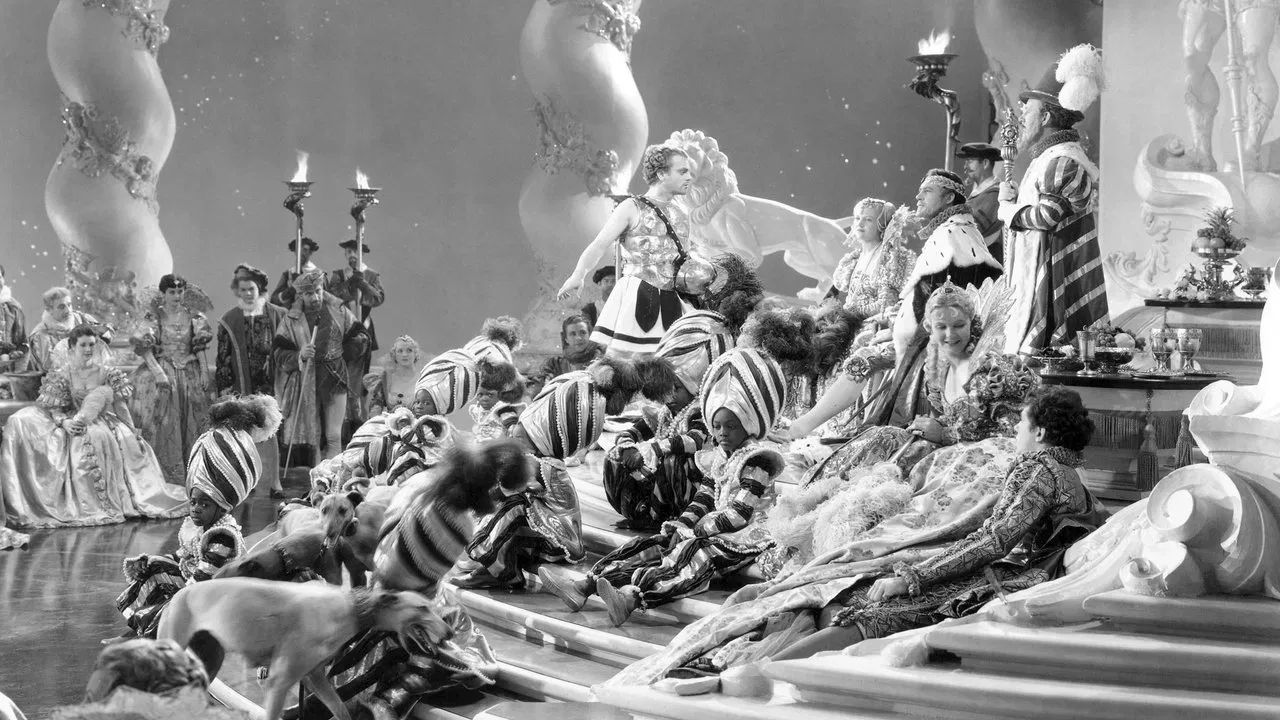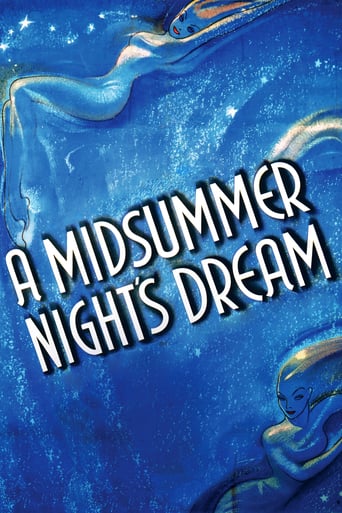

The spirit that animates this version of the play is not that of William Shakespeare but Felix Mendelssohn. Shakespeare's text has been trimmed to a nubbin and hashed up by the "arrangers," Charles Kenyon and Mary C. McCall Jr., and it's gabbled by the all-star cast. Strangely, Olivia de Havilland as Hermia and Mickey Rooney as Puck are the worst offenders, and they are the only members of the cast of Max Reinhardt's celebrated 1934 Hollywood Bowl production, which inspired Warner Bros. to film the play, who made it into the movie. De Havilland delivers her lines with heavy emphasis on seemingly random words and with odd pauses, while Rooney punctuates every line with giggles, chortles, and shrieks that affect some viewers like fingernails on a chalkboard. Nobody in the cast seems to be aware that they're speaking verse. Fortunately, the decision was made to use the Mendelssohn overture and incidental music (along with snippets of other works by Mendelssohn), and to have it orchestrated by Erich Wolfgang Korngold. The result is an opulently balletic version of the play, taking advantage of what can be done in movies that can't be done on stage. Is it good? Maybe not, but it's much more fun than the stodgily reverent version of Romeo and Juliet (George Cukor, 1936) that MGM came up with the following year. Casting James Cagney as Bottom/Pyramus and Joe E. Brown as Flute/Thisby was a masterstroke, and if they had been directed by someone with a surer sense of American comic idiom than Reinhardt, the Viennese refugee from Hitler who spoke very little English (Dieterle acted as interpreter), the results would have been classic -- as it is, they're just bumptious fun. Much of the movie is sheer camp, reminiscent of the twee illustrations for children's books in the early 20th century. But there is a spectacular moment in the film when Oberon (Victor Jory) gathers the fairies, gnomes, and bat- winged sprites to depart, under a billowing black train that sometimes resembles smoke. The cinematography by Hal Mohr won the only write-in Oscar ever granted by the Academy. (charlesmatthews.blogspot.com)
... View MoreOn a hot midsummer night, what could be more appropriate than this great Max Rinhardt's Warner Brother's classic? The movie is an American classic for "doing" Shakespeare with sound. The effects are wonderful for their time, the music is just right, and American audiences of that era would have recognized many of the cast members. The characters from this version of this well-known Shakespearian play give us lots of fun and joy. They argue; they sing, they dance; they fly through the air. They could be young lovers forced to obey orders of the Duke; they could be jealous woodland fairies; they could be a group of excited simple townsmen who want to win a prize from the Duke; or they could be Athenian royalty. OK, This movie is higher on special effects like--- gossamer images and Mendelssohn's incidental music-- than it is Shakespeare's actual script. Yet, everyone who loves Shakespeare should see this version just because you might want to see Olivia de Havilland (as Hermia), Dick Powell (as Lysander), James Cagney (as Bottom the Weaver), Joe E. Brown (as Flute the Bellows-Mender), and Frank McHugh (as Quince the Carpenter). In the Fairlyland cast, Victor Jory is Oberland , Anita Louise is Titania, and a 14-year-old Mickey Rooney is Puck. The movie won an Oscar for Best Cinematography (Hal Mohr)—as the first and only write-in nominee to actually win, and Best Film Editing (Ralph Dawson). It was nominated Best Picture but lost out to Mutiny on the Bounty and a host of other great choices.
... View MoreAn early film adaptation of Shakespeare and it's aged pretty well. There are some obvious moments where modern film-making would have improved things, especially the lighting. The long version is really long, with the ethereal fairies moving about in a way that added nothing to the film.As for the acting, my primary negative takeaway is with Puck. Mickey Rooney played the sprite, and over acted it entirely. At the start, it was mildly charming. With every scene it was made worse with his voice and his laugh. I came to dread every scene in which Puck was in. It wasn't helped by the lovers being uninteresting as well. There wasn't much chemistry between them and Lysander also had an unfortunate laugh.The film was saved, by two things. One, it's Shakespeare. The plot and dialogue are solid and it was a fine adaptation. The best part of the movie, were the players. Joe E. Brown's comic relief was great. The last scene of the movie featured him and it leaves one with a great feeling of the movie.The surprising, was James Cagney as Bottom. His part was perfectly played as an over-acted role and he was clearly having fun doing it. He was deserving of an Academy Award nomination, as it really was one of the best of his career. To anyone thinking of him as just a hard nosed gangster, he had some great range.It was truly a joy to watch Cagney, and I almost wonder how he would have handled the Puck role. It couldn't have made things worse than Mickey Rooney already did. Watch this movie because it's Shakespeare and James Cagney. Just try not to let Mickey Rooney force you to stop before the end.
... View MoreWhen I saw this movie for the first time I knew I'd never seen anything remotely like it, well I was 10 years old after all. But over 40 years later that still holds – this is a unique experience, a revelatory motion picture that entertains, educates and manages to inform you who you are too. Are you a Shakespeare or a movie purist or simply someone who can accept nobody and nothing is perfect and that therefore Shakespeare and movies can possibly be complemented or improved upon by later (agreed, exceptional) talent? I read the play a few years later and was entranced but would still prefer to have this gossamer Max Reinhardt masterpiece with me for company on a desert island instead. Various young people in Athens fall asleep in wood and various fairies, nymphs and elves come out to play and play the fool with them. It's the relentlessly dreamy and inventive Oscar winning camera work that takes the attention first, but the brave casting of currently popular Warner Brothers stalwarts then takes the breath away. I wish Dewey Robinson could've been given a meatier role! From his er, exuberant performance as Puck I grew up thinking Mickey Rooney must've been a marvellous actor! I always had a soft spot for James Cagney after seeing him in his key role here as Bottom – his tearful realisation of his newly acquired animal magnetism had me transfixed. Olivia de Havilland never looked lovelier when she was being washed by the gleaming arc-moonlight or lying on the gleaming grass. But everyone else was gorgeous too, male, female or otherwise - and I don't care either, I almost wished Dick Powell and Ross Alexander had launched into a croony duet over Hermia! It was Victor Jory's strangest role but he never bettered it. All manner of glimmering glossy shiny tricks were used to promote the astounding ethereal atmosphere, so much so that if I saw the play at the Globe it would probably still look incomplete even if it obviously sounded more authentic.Just referring to this film version mainly as a stand-alone piece of entertainment and not as in direct comparison to the play, I can hardly fault it. So I would have to summarise that in the main: We shall not see the likes of this again.
... View More